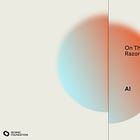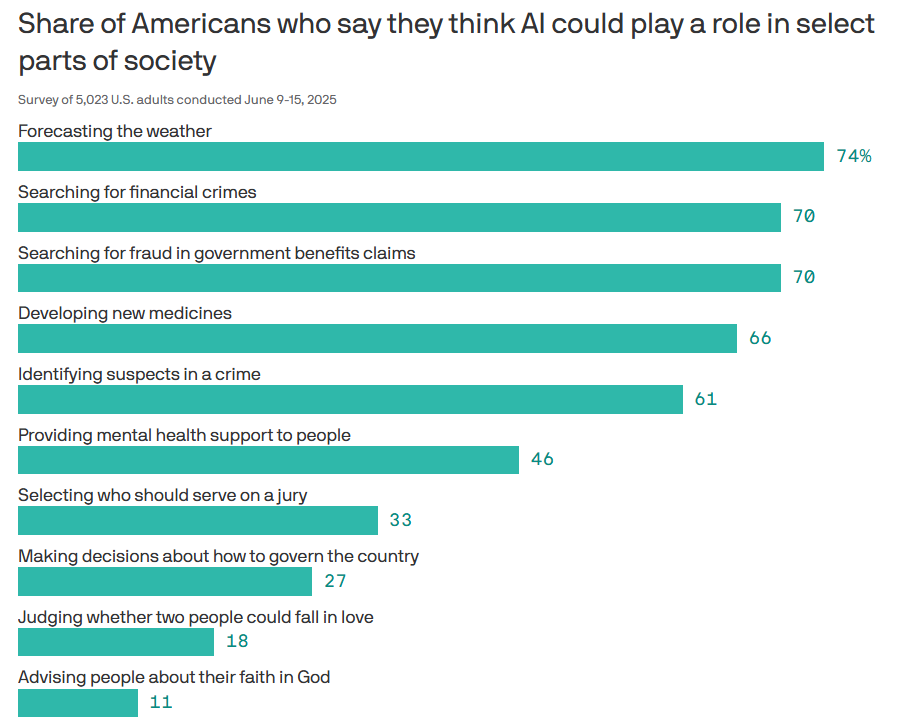How do normal people view Generative AI technology?
The Pew Survey and OpenAI report give a lot more grounded data on the reception and issues with Generative AI. Its impact on autonomy, relationships, creativity and freedom are highlighted.
If you think this topic is important, why not share it with a colleague, friend, or acquaintance. It’s a revealing survey to say the least.
Hello there,
AI might not be normal technology, after all.
I’m very interested in how actual people on the street and normal citizens view AI outside of the tech bubble, and AI enthusiasts and professionals maybe who may be over-exposed to BigTech owned media and algorithms like some of us active on LinkedIn, X, YouTube, TikTok or even here on this platform.
Last time we took a look at many European perspectives in the AI vs. Everything We Care About article. More recently a Pew survey has confirmed a lot of those views for the common American as well.
In this article I’ll try to give some factual survey responses, infographics, quotes, and some of my own commentary and related concerns on the economy and AI’s impact.
AI awareness and attitudes: TL;DR
“50% say they're more concerned than excited about the increased use of AI in daily life, up from 37% in 2021. 10% are more excited than concerned. 38% say they're equally excited and concerned.”
As you might know, the Pew Research Center is a nonpartisan fact tank that informs the public about the issues, attitudes and trends shaping the world. That is, they conduct public opinion polling, demographic research, content analysis and other data-driven social science research. They do not take policy positions. So I consider them fairly well equipped to give us a non-biased view of public opinion.
Different from their April survey, the September survey covered the topic:
How Americans View AI and Its Impact on People and Society
Curiously, they had many of the same concerns as the Europeans featured in research that the Seismic Foundation covered in their large-scale effort to answer how ordinarily people view AI risks. Download the entire report.
Also I have to note how entirely pedestrian the ChatGPT paper that dropped recently is on how ordinary people use ChatGPT, 70% don’t even use it for work. Amongst key findings of their study is faster growth in non-work-related ChatGPT usage than in work-related usage! People seem to use ChatGPT not for Mollick like augmentation or automation but pseudo-companionship and AI Mom type advice and executive function assistance (therapy and support). Think the stereotype of students using it for writing, still holds mostly true in the macro picture. In the big picture regular folk don’t actually see AI in a very high regard in the real-world it surprisingly, or unsurprisingly, turns out.
The Pew Survey captures a snapshot of some of the more realistic side of how ordinary Americans view AI.
The reception to consumer Chatbots is fading and extremely mixed
I want you to pay very close attention to what the Pew Center survey and OpenAI’s paper about ChatGPT use says about the actual state and reception of Generative AI, nearly three years since the launch of ChatGPT.
U.S. citizens appear to favor narrow AI and not General Intelligence controlling various aspects of society.
Americans are comfortable with AI being benefactors and not meddling too much. They dislike any interference in their freedoms, sense of control and livelihood. But also the harming of their human relationships (which has been occuring).
Concerns over AI eroding both creative thinking and relationships feature prominently in their answers.
I’ll note here that Nita Farahany’s Newsletter goes into some interesting details around deskilling risks, brain health and cognitive hygiene as it relates to AI.
Thinking Freely Newsletter 🎓
Americans see a role for AI in some areas of society but want more control over its use. About half say it’ll erode creative thinking.
Ordinary Americans don’t like Generative AI trying to do any heavy lifting or relationship meddling for them and fear deskilling in both cognition and relationship building extremely much!
Since 2021, Pew has been asking participants how they feel about the increased use of AI in daily life.
According to Axios, in 2023, 2024 and 2025, about half of Americans said they were more concerned than excited about it. The rift between Silicon Valley and BigTech and the general public appears to be growing.
The Pew Center survey of September, 2025 gives us a lot to consider about AI’s impact in the real world. Some of the observations in the survey lead to more questions than answers about AI’s impact on society and the cons of ChatGPT usage in particular.
This is as much a verdict of young Americans on ChatGPT, as anything else you can find on the internet today. And it’s extremely worrisome. Especially if you care about human beings as creative, meaning making, relationship building, autonomous and self-determining and thriving adaptable people. The health of civilization itself might be implicated here.
The survey relates to AI’s impact on society three years later, after ChatGPT went viral.
Separately and recently, kyla scanlon also conducted a survey on AI that works for workers: She asked around 1,200 people about their expectations and hopes. She asked some really poignant questions like:
What’s the biggest benefit you hope AI could bring to your work?
What’s your biggest concern about AI at work?
Has your employer provided training on how to use AI tools? (and more I will include some of the answers at the end, as they add an interesting layer to the main survey covered).
Kyla’s Newsletter is a must-read for macro economics and impacts on the vector of a bunch of different things with American human-centric economic analysis in focus.
Don’t let the lack of real media coverage fool you, Americans aren’t actually optimistic about AI. If anything they want it to stay in its lane and not influence them too much as citizens, consumers, social beings and workers.
The Pew Center data really might surprise some people and I can’t help but wonder if it’s prophetic about what’s to come.







